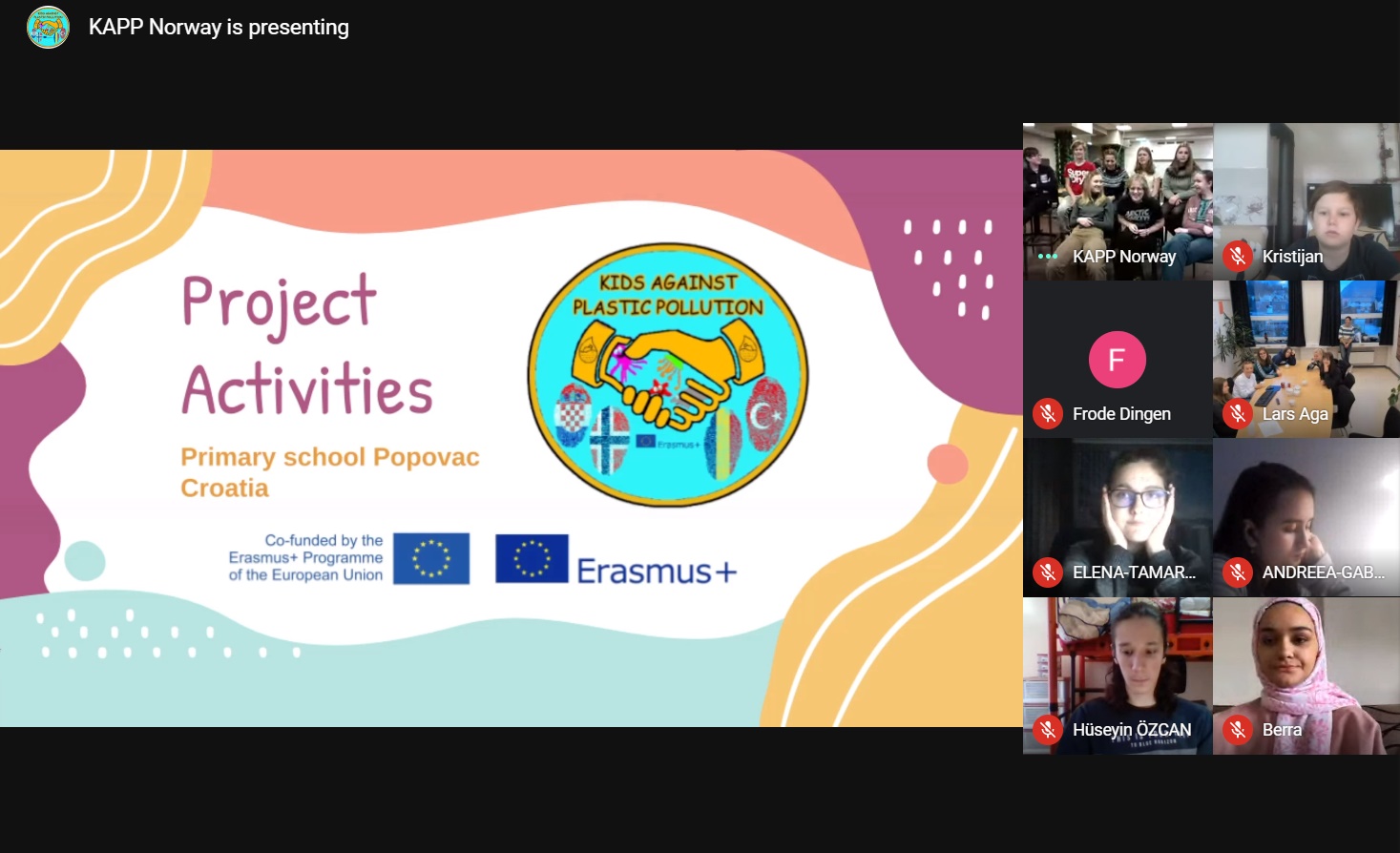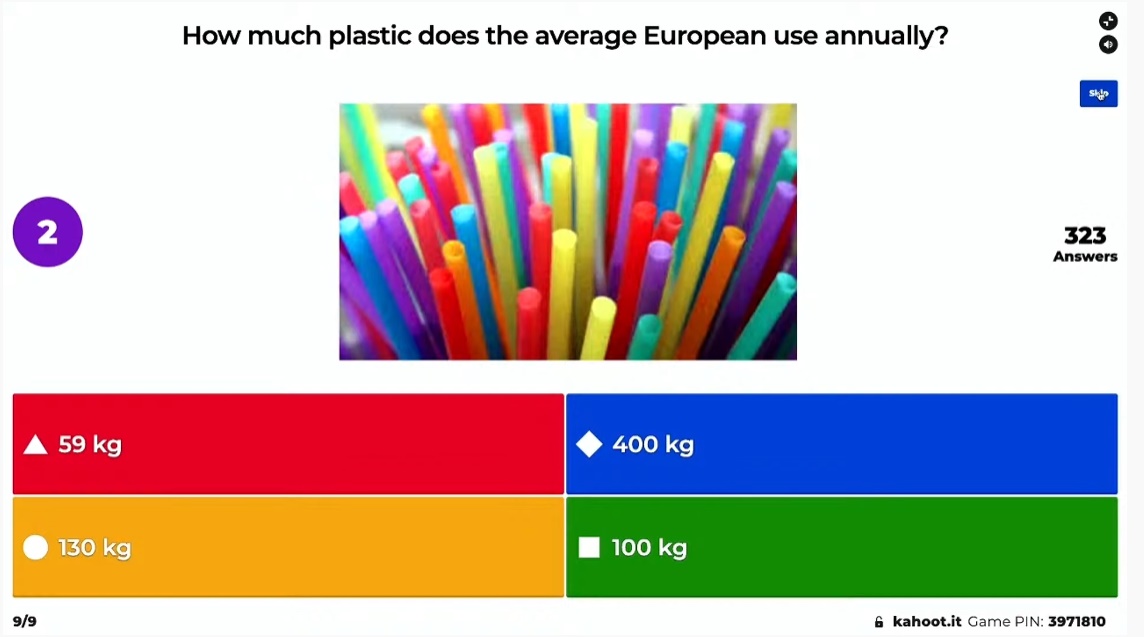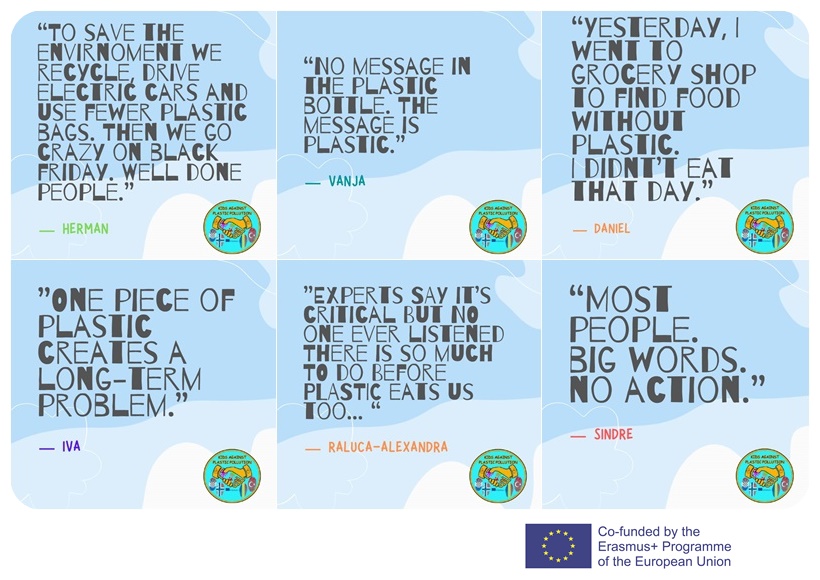Why Young Students from Baranja Said YES to Virtual Mobility
December 14, 2020 - Since the students and employees of the Elementary School Popovac didn't travel to Norway in April this year due to the coronavirus pandemic, they have decided to give virtual mobility a chance.
Instead of searching for a possible excuse, the students took the tasks seriously and used the possibilities of technology for learning and socializing during the fourth, and also the last, mobility of the Erasmus+ project “Kids Against Plastic Pollution”.

Two schools from Bergen and Odda took care of a diverse programme from the 7th to the 11th of December 2020. Together with the Norwegian hosts, students from the Romanian Tulcea and Manavgat in the south of Turkey also played a big part, as well as the young people of Baranja mentioned earlier.
The first day of the collective online meeting started live with the opening ceremony and once again reminded them how much progress the schools have made since the beginning of the project implementation. Six students from each country presented what they did in their schools from September of 2018 until now and what plans they have for the future regarding the continuation of the battle against plastic pollution.
As a cultural segment with which they decided to represent Croatia and Baranja, the students chose the folk dance “Little Apples”. The Romanian folk motif embroidery on canvas, the importance of coffee in Turkey, and the representation of the Norwegian cultural flavour through photographs of cities followed by the musical background of the school band were presented in the afternoon live broadcast.
One of the activities of the day was a discussion on plastic pollution at the level of each school separately. The students agreed that it is essential to continue educating their friends, family, and the locals even after the project has been carried out.

Considering that due to epidemiological measures larger gatherings are not allowed in Croatia, instead of all students of the school, twelve 1st grade students headed to an environmental clean-up action with their teacher Ivana Vrbek Mesić. Besides Popovac, eco-friendly primary school students from Kneževo, together with their teacher Lidija Štimac, also found different kinds of garbage, from paper to bulky waste. In their actions, they clearly said: “Don’t leave anything but your footprints in nature!” Clean-up actions took place in all four countries.
On the third day of the videoconference, the emphasis was on the creative writing of short messages using the format "Skrifta på Veggen" (Writing on the Wall). The students came up with messages about sustainable development, plastic, and pollution.
“We enjoyed the process of writing strong eco-messages with as few words as possible. It was interesting to hear how our peers from other countries think. We all want for our voice to be heard more when it comes to plastic pollution,” reported Ivano Rohtek, a 7th-grade student.
Thursday was a day when students could enjoy the performance of gifted young musicians from Rothaugen and Odda. The live broadcast was followed by a virtual meeting of six students from each school who were supposed to report on the clean-up action in their local community. In line with the given form, in which they wrote down the number of certain kinds of waste, they informed the partner students of their findings.
On the last day of virtual mobility, prepared meals were shown from other countries, after which the voting took place for the best master chefs of the following specialties: Norwegian Salmon Pasta, Romanian mamaliga balls, Turkish karniyarik/stuffed eggplant and Baranja stuffed peppers. Afterward, the students listened to five podcast shows on plastic pollution and talked via videoconference about the guests, their statements and mentioned issues, and the things they learned. Around 500 students with a competitive spirit, through games and entertainment, checked their knowledge by solving the quiz “Say NO to Plastic” and, with the award of certificates, the five-day virtual mobility was officially closed. Of course, all schools were grateful to the Norwegian hosts, who managed to prepare an excellent programme in this unusual period and to crown two and a half years of learning, good cooperation, and friendship exceptionally well. The slogan of the newest Erasmus+ campaign is “We’re Stronger Together”, which the students in the project “Kids Against Plastic Pollution” showed numerous times.
And while some wonder why engage in the implementation of virtual mobility in these very strange times full of uncertainty and a dose of fear, computer science teacher Goran Podunavac and the school librarian Marijana Kuna say that they haven’t regretted a single moment of it.
“The spotlight was on the young people, who proudly presented what they learned about plastic pollution. Together they accomplished changes in their environments. I am proud of the results and I am certain that there will be more opportunities for cooperation, which are accompanied by the greatly anticipated travels. We would all like to be in Norway these days, but virtual mobility is also an invaluable experience for our small school,” says librarian Kuna.

“I was pleasantly surprised with students’ activity, despite the work being done mostly during remote learning. They became more flexible and came to grips with various digital tools in order to, for example, record their podcast shows and culinary challenges. They established communication with their peers from partner schools without any problems and prepared digital quizzes and other materials together. We said “yes” to the virtual mobility and engaged almost all students, and not just six, which would be the case with physical mobility,” teacher Podunavac notes.
You might have heard that doing project activities online instead of going to physical mobility is "lost" mobility, but that blanket statement doesn't sit right for many reasons, such as achieving intercultural competences, linguistic skills, collaborative learning, media and digital skills, open-mindedness, teamwork, critical thinking, and networking. Those are more than good reasons why these students and teachers said yes to virtual mobility and never even thought of throwing away a chance to be part of it.
Until the next collaboration and mobility (physical, blended, or virtual), let’s continue to be responsible, take care of each other and stay healthy because this dark winter will not last forever. Spring will come again. It always does.
Follow Kids Against Plastic Pollution on Facebook here, and on Instagram here.
Text written by Goran Podunavac and Marijana Kuna from Elementary School Popovac


